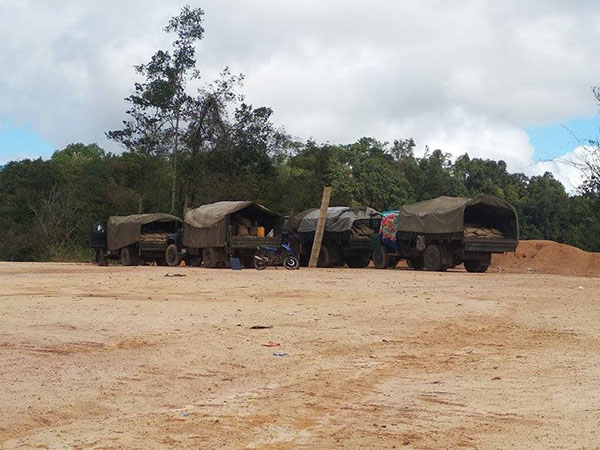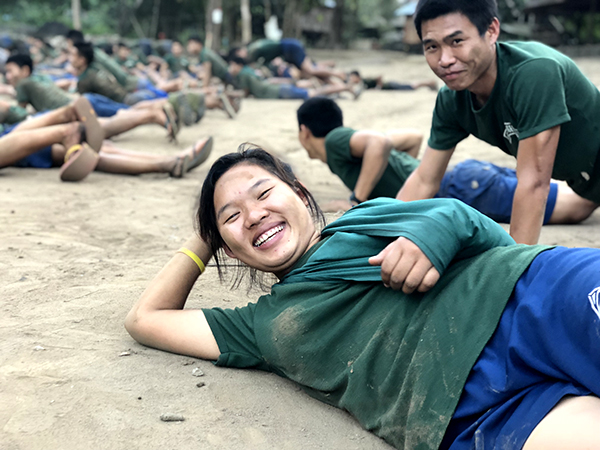Voices from Burma: Growing Up Under War in Karen State
24 February 2019
Karen State, Burma
Hser Nay Paw is a 17-year-old medic from Karen State. She joined FBR training to learn more about medicine so that she can return to her village, where there is no medical clinic, to share and apply her knowledge. She also hopes to help educate the children in her village and put on Good Life Club programs for them. Here, she shares stories of how the civil war has affected her life.
Life in Karen State
“When there was fighting, the Burmese military shelled big mortars to my village. A big mortar hit half of my house. My house and village burned. It was the evening. My mom was tired from farming all day so she was taking a nap. I was having my dinner when I heard the mortars but I grabbed a pack and ran. I didn’t know what it was I just grabbed it and ran. I ran to the other side of the village.
My brother jumped into the bushes to hide and get away from the fighting and fire. Since then I haven’t seen him. I don’t know if he is alive or not. I lost my mom because while she was sleeping the mortar shells hit my house and burned [it] with my mom inside. My mom was burned alive.
I ran slowly with my pack by myself to the Thai side because I was near the Thai-Burma border. There is a Thai flag waving on the Thai side. I ran to the flag. If you are on a motorbike it takes 30 minutes. It took me two hours. Many other people had to run to the flag, too. Late at night my grandfather arrived. I saw four families on the Thai side that had also run from my village. As soon as my grandfather arrived, we moved to a refugee camp.
I have had to run because of fighting four times. The serious instances – four times. The most memorable was when I was eight years old, when I lost my mom. Many other times I have had to run when there was very serious fighting. Now the fighting is still going on but it is not as serious, just ongoing.
During the fighting many villagers have died, some got injuries, and some women and girls get raped. Surrounding my village there are lots of landmines. [Even] now when the villagers go into the jungle to find vegetables and food they step on landmines. The villagers know there are landmines. They set the surrounding areas on fire so that the landmines will explode. Not every landmine explodes. There are some that remain and often cows and buffalos will step on the landmines and explode. The villagers don’t dare go around areas they know Burma Army have hidden landmines.
[Because of] landmines, when we run from fighting we cannot run to the front of our village because they are covered with landmines. We cannot run to the back of the village because there is a militia. If we run to the west side the Burma Army is waiting there and will kill us. We can only run to certain parts. But if we run to the Thai border, the Thai police will arrest us. Sometimes we have no choice. No place to run. I was fast and quick to get to the Thai border but some people got caught crossing and the Thai police arrested them.

When the Burma Army comes into my village they rape girls and women. This happened when I was eight. My cousin got raped by the Burma Army. My cousin was shot in the head during fighting so the Burma Army caught her and raped her. She got raped and after she passed away. One of my aunts got raped, too. She became mentally crazy. My cousin who was raped and then died was only 12 years old. She was my mom’s sister’s daughter. I was 8, she was 12. I asked her to run but she didn’t. She said it would be fine. That’s why she didn’t run. She thought everything was going to be okay. That’s why she didn’t run.
Before this we had to hide under the house from mortar shells. Sometimes when we are hiding we see a militia coming into the village. We help them too and let them hide or help in any way possible. Sometimes the militia soldiers stand in front of our hiding place. We tell them to move because we are scared the Burma Army will see the militia soldiers and try to shoot more mortar shells at them and hit me and my family, too. So we tell them to move and go fight somewhere else.
A [Burma Army] soldier arrested my grandfather once. They poured hot water through my grandfather’s nose and ears and pulled all of his fingernails. The Burma Army tortured my grandfather in front of me. I was hiding in a hole under the house. I could see all of the terrible things happening to my grandfather.
Whenever we hear gunshots, we jump into the hole with rice and everything. No matter where we are if we hear gunshots we have to run and jump into the hole under our house. Sometimes the Burmese military comes near where I live. They shoot where I live very often. They shoot from the top of the mountain into where I live. They don’t come into my village but they shoot from far away. If the situation is serious then we have to run. My grandfather always thinks a lot and listens carefully about whether we should run or not. When the situation is bad, my grandfather will tell me to go to my Aunt’s village or other villages.
Her message to others:
“I want to be with my family. I want the fighting to stop, I don’t like war. I want to reunite with my family again. I want to help kids have a chance to go to school. I want help.
I want the soldiers not to come to my village anymore, and I want to be with my family together again. I want to have my village- a village like before. And I don’t want any more war.
I want girls to be protected from being raped by other guys. Even now when we go to the jungle to get foods and vegetable there are Burmese soldiers in the jungle. They chase after the girls and rape them. I want to be secure enough to freely pick fruits and vegetables.
A few months ago we were followed by a Burmese soldier and we had to run. I was with my two old aunts, we went to the forest to find fruits and we were followed by a soldier. At first we thought what was that but then we realized it was the enemy following us. We did not get caught. We ran really fast.”
Hser Nay Paw’s story and experiences, while unique, are also common throughout Burma’s ethnic groups who have lost family, their homes and land, and had to flee because of the Burma Army. For over 70 years, these stories have become more and more common as civil war and oppression continue in Burma. Please join us on March 10 for the Global Day of Prayer for Burma where we’ll be praying for Hser Nay Paw and those who are seeking peace and freedom in Burma. For more information about Burma and to download a copy of the Day of Prayer magazine, please visit our website.

